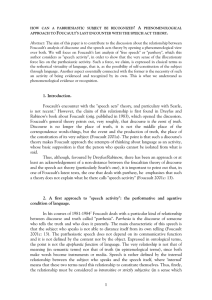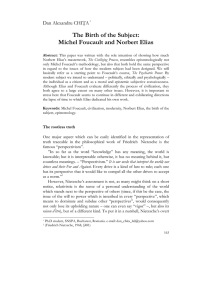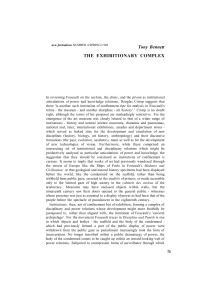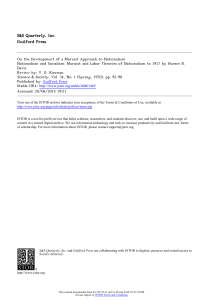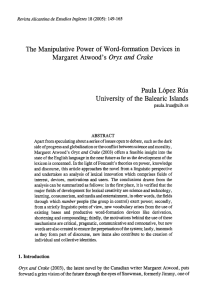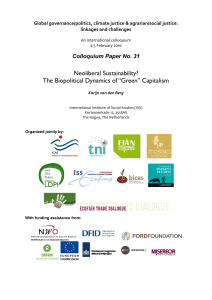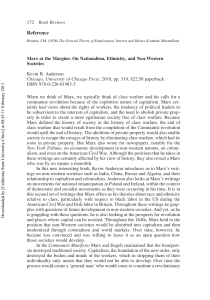Foucault's Marxism: Critique and Influence in Continental Thought
Anuncio
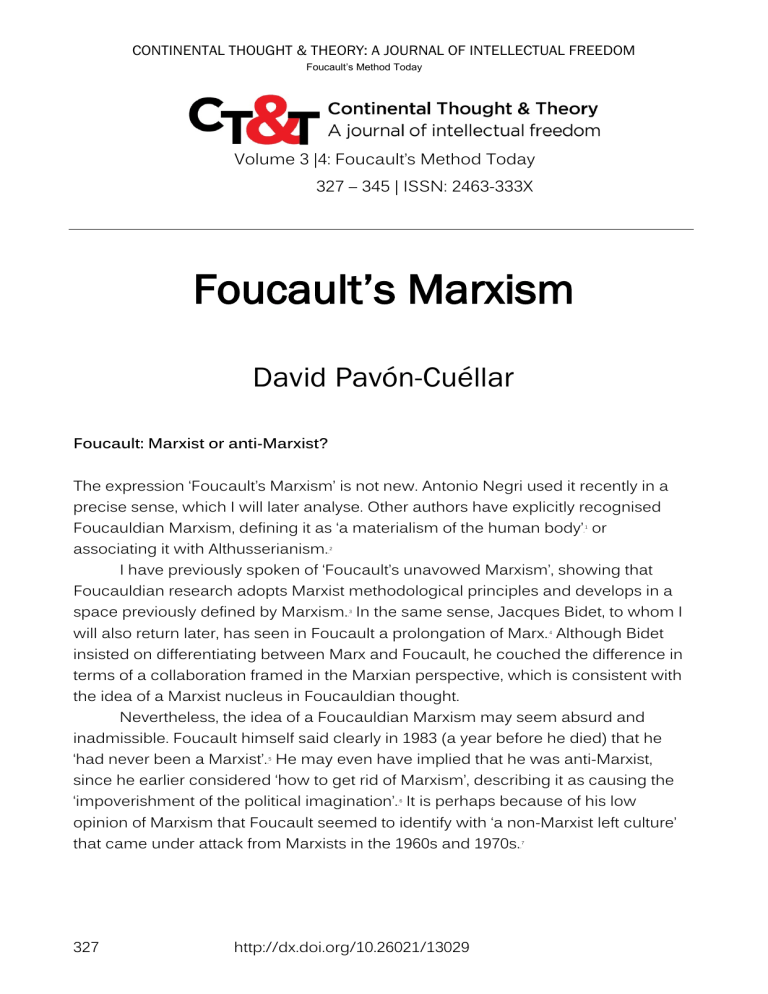
CONTINENTAL THOUGHT & THEORY: A JOURNAL OF INTELLECTUAL FREEDOM Foucault’s Method Today Volume 3 |4: Foucault’s Method Today 327 – 345 | ISSN: 2463-333X Foucault’s Marxism David Pavón-Cuéllar Foucault: Marxist or anti-Marxist? The expression ‘Foucault’s Marxism’ is not new. Antonio Negri used it recently in a precise sense, which I will later analyse. Other authors have explicitly recognised Foucauldian Marxism, defining it as ‘a materialism of the human body’ or associating it with Althusserianism. I have previously spoken of ‘Foucault’s unavowed Marxism’, showing that Foucauldian research adopts Marxist methodological principles and develops in a space previously defined by Marxism. In the same sense, Jacques Bidet, to whom I will also return later, has seen in Foucault a prolongation of Marx. Although Bidet insisted on differentiating between Marx and Foucault, he couched the difference in terms of a collaboration framed in the Marxian perspective, which is consistent with the idea of a Marxist nucleus in Foucauldian thought. Nevertheless, the idea of a Foucauldian Marxism may seem absurd and inadmissible. Foucault himself said clearly in 1983 (a year before he died) that he ‘had never been a Marxist’. He may even have implied that he was anti-Marxist, since he earlier considered ‘how to get rid of Marxism’, describing it as causing the ‘impoverishment of the political imagination’. It is perhaps because of his low opinion of Marxism that Foucault seemed to identify with ‘a non-Marxist left culture’ that came under attack from Marxists in the 1960s and 1970s. 1 0F 2 1F 3 2F 4 3F 5 4F 6 5F 7 6F 327 http://dx.doi.org/10.26021/13029 CONTINENTAL THOUGHT & THEORY: A JOURNAL OF INTELLECTUAL FREEDOM Foucault’s Method Today It is true, as we shall see later, that Foucault’s anti-Marxism did not always reflect a rejection of Karl Marx himself. But Foucault also turned more than once against Marx. Didier Eribon recounted that in 1975, when a young activist invited Foucault to speak about Marx in her organisation, he responded brutally: ‘Don’t talk to me about Marx anymore! I never want to hear about that man again. For me, Marx is a done deal, it’s over’. This opposition to Marx and Marxism is at the heart of Foucault’s reflections. Étienne Balibar formed the hypothesis that, ‘in ways that were constantly changing, the whole of Foucault’s work can be seen in terms of a genuine struggle with Marx, and this can be viewed as one of the driving forces of his productiveness’. In a similar vein, Didier Eribon conceded that ‘all of Foucault could be explained ... by the rejection of Marxism’. Eribon also pointed out that some of Foucault’s most important books, such as Discipline and Punish and The Will to Knowledge, were written ‘against the Marxist theory of power’ and specifically against the Althusserian concept of ‘ideological state apparatuses’. Opposition to Marxism also seems to have been the impetus for Foucault’s other great book, Words and Things, which was widely repudiated by Marxists and progressive intellectuals at the time. One of them was Jean-Paul Sartre, who observed that, in that book, Foucault took a stand against Marxism, proposing ‘a new ideology, the last barrier erected by the bourgeoisie against Marx’, which sought to ‘suppress’ Marxism. The relationship between Foucault and the Marxists of his time was, at least at first glance, one of antipathy and conflict. Foucault was frequently perceived as a reactionary thinker by the political and intellectual left, which was still dominated by Marxism. We must not forget that the time of Foucault was also that of 1968 thinking, which, as Eribon rightly observed, is ‘rather Sartre and Lefebvre than Foucault and Lacan’, to the point that the French May has been interpreted as ‘the revenge of Sartre and the “fusion group” of his monumental Critique against structuralist immobility’, in which Foucault is usually included. Everything seems to oppose Foucault and Marxism. A recently declassified CIA document even praised Foucault, along with other French intellectuals, for his contribution to the ‘demolition of Marxist influence in the social sciences’. This document has gone viral and has often been interpreted as confirming Foucault’s incompatibility not only with liberation struggles on the left, but also with Marx and Marxism. All in all, it seems that Foucauldian anti-Marxism is beyond question. In fact, as we will see in the first section, Foucault openly criticised the Marxist tradition on several occasions and with powerful arguments. However, as I will endeavour to 8 7F 9 8F 10 9F 11 10F 12 11F 13 12F 14 13F 328 http://dx.doi.org/10.26021/13029 CONTINENTAL THOUGHT & THEORY: A JOURNAL OF INTELLECTUAL FREEDOM Foucault’s Method Today show in the following sections, his critique did not generally target Marxism overall, but only some of its historical expressions. If we accept the existence of multiple Marxisms, it can be said that despite those questioned and rejected by Foucault, there is one that he celebrated, adopted, and promoted, and that is presupposed and implicated in his thinking. There is, in two words, a Foucauldian Marxism. This Marxism, like any other, requires a critique, like the one that follows, to distinguish and distance it from what differs from its interpretation of Marxism. The Foucauldian Critique of Marxism Among the reproaches that Foucault addressed to Marxism, the most devastating and irreconcilable with the idea of a Foucauldian Marxism was, significantly, one of the earliest. In Words and Things, published in 1966, Foucault seemed to irrevocably condemn the Marxist tradition, contradicting his friend and mentor Louis Althusser by stating that Marxism did not represent any ‘real rupture’ with the knowledge of his time, but that ‘it is in the 19 century like a fish in water; that is to say, at any other time it stops breathing’. Accordingly, there should be no place for Marxist discourse in the twentieth century, and it would not make sense to speak of a ‘Foucauldian Marxism’. By contextualising and historicising Marxism, Foucault confined it to a precise historical period, contesting its validity for times to come and for the rest of history. This questioning began in 1966 and continued in the following years; for example, in 1971, Foucault stated that he did not understand ‘why Marx should be sacralised in a kind of timelessness that would allow him to detach himself from his time and found a metahistorical science’. Even in 1978, Foucault continued to reiterate that ‘Marx clearly belongs to the 19 century’ and that ‘he played a particular and determining role’ that ‘is typical of the 19 century and only works there’. The persistence of the latter idea is disconcerting when one recalls that Foucault had already rectified his 1966 judgement of Marx relegated in the nineteenth century. In 1971, Foucault recalled that judgement, regretting that it was not more precise, and clarified that he was referring not to Marx or his followers in general, but only ‘to Marxism as it functioned in Europe until the beginning of the 20 century; the species of Marxism found in some commentators on Marx, such as Engels’. Foucault also recognised that Marx ‘proposed a historical analysis of capitalist societies that may still have validity and that founded a revolutionary movement that is still the most alive today’. This acceptance of Marx’s validity, as we will see, tended to prevail over time in Foucault’s thinking. th 15 14F 16 15F th th 17 16F th 18 17F 19 18F 329 http://dx.doi.org/10.26021/13029 CONTINENTAL THOUGHT & THEORY: A JOURNAL OF INTELLECTUAL FREEDOM Foucault’s Method Today Foucault’s critique of the supposed archaic and anachronistic character of the Marxian contribution could presumably be a simple reaction to the sterile reproductive work of the Marxists of his time. In the History of Madness in 1961, Foucault attributed to them ‘prejudices of method’, such as their conviction about the ‘increasing perfection in the order of knowledge’. Later, he reproached them for their ‘non-inventiveness’ and the fact that they were ‘so trapped in the canon ... that they were not capable of making an effective historical analysis’. For Foucault, such an analysis required a direct relationship with history, whereas Marxists preferred to avoid historical reality and concentrate on explaining Marx’s texts concerning that reality. Foucault precisely critiqued a text by Étienne Balibar, claiming that the author was more interested in the validity of the Marxian theory of the State than in the real data regarding the political situation of his time. Here Foucault detected an attitude characteristic of Marxists, ‘their distrust of the historical material, of the historical reality with which they deal, and their infinite respect for the text, which necessarily shackles them to the academic tradition of textual explanation’. For Foucault, the Marxism of his day was academically biased, which was rather paradoxical, given Marxist intellectuals’ general mistrust of academia. Marxist intellectuals of the 1960s and 1970s were still trying to represent and guide the masses via theory. This orientation was directly questioned by Foucault, who, on the one hand, perceived a ‘vanishing Marxism’ with outdated intellectuals conceived as bearers of universality in its ‘conscious and elaborated’ form, but, on the other hand, argued that ‘it is not a question of providing the struggles with a guiding thread or a theoretical apparatus, but of constituting possible strategies’, adding that ‘Marxism—I am referring to scholasticism, this traditional body of knowledge and texts—does not give us any strategy, while the struggles have multiplied on all fronts: sexuality, psychiatry, medicine, prison system’. Partly prompted by the impetus of the 1968 movement, new struggles appeared that required a strategic approach rather than theories like those of Marxist scholars— theories that did not correspond to the new struggles. Foucault seemed to assume that the theoretical contributions of Marxism were somehow predetermined and compromised by their incorporation into academia. The ‘trend of academic Marxism’, for example, considered ‘how the economic conditions of existence can find their reflection and expression in the consciousness of men’. Foucault rejected this research, as well as the correlative idea of ideology as concealment of the truth—an idea that he also placed in ‘a certain conception that the university environment has of Marxism or in a certain conception of Marxism that has been imposed in universities’. 20 19F 21 20F 22 21F 23 22F 24 23F 25 24F 26 25F 330 http://dx.doi.org/10.26021/13029 CONTINENTAL THOUGHT & THEORY: A JOURNAL OF INTELLECTUAL FREEDOM Foucault’s Method Today In the last quoted passage, as in the previous one, it appears that the academic or university environment was mainly responsible for the negative and economistic Marxist ideology that Foucault repeatedly criticised. It was, in other words, apparently an error not of Marxism, but of academia or of Marxism only understood—misunderstood—as scholasticism, as a traditional body of knowledge and texts, as in the above quotation. The problem, then, is with a certain type of Marxism, not with Marxism in general. Foucault not only rejected scholastic, academic, or academicist Marxism, but also a similar trend—scientific or scientistic Marxism. In this case, as Foucault explicitly recognised, the problem is not Marxism, but the people who ‘label as science something as important as Marxism or something as interesting as psychoanalysis’—people who reveal an ‘insecurity’ that makes them ‘have a higher idea of science than it deserves and have a secret contempt for psychoanalysis and for Marxism’. Foucault seems to be implying herein that he values Marxism more than the Marxists themselves. What is certain is that he appreciated Marxism more than science and that he recognised the importance of something as important as Marxism. Foucault did not think that one ‘values’ or ‘praises’ Marxist discourse by conceiving it as scientific discourse or even as ‘the science of sciences’. On the contrary, if Foucault had ‘an objection against Marxism’, it was that ‘it can effectively be a science’ and thus have the ‘power effects’ of scientific discourse. Once again, the problem is not Marxism, but scientism, referring to the scientific claims of Marxism and their power effects. ‘Marxism as a science’ was for Foucault ‘a dynamic with coercive effects on a certain truth’, with ‘coercive forces not only towards the past, but towards the future of humanity’, due to the ‘prophetic character’ of Marxist knowledge. As a science and a prophecy that employs political power, the kind of Marxism condemned by Foucault is a ‘modality of power’ from which we must ‘free ourselves’—a knowledgepower whose effects must be ‘attenuated or reduced’. This Marxist knowledgepower is, in other words, an ‘art of government’, a ‘governmental rationality’, a ‘search for a type of governmentality that will be indexed to ... the rationality of a history that gradually manifests itself as truth’. In Marxism, as in any other field, the rational plane of truth and knowledge, and of science and scientificity, is inseparable from the political plane of power and governmentality. This link with the ‘mechanisms of power’ was for Foucault a strength of Marxism, but also its weakness and the reason it was ‘defeated’ in the 1960s and 1970s. This defeat was social and political, among the masses and their leaders, but also theoretical and methodological, among intellectuals such as Foucault and 27 26F 28 29 27F 28F 30 29F 31 30F 32 31F 33 32F 34 33F 331 http://dx.doi.org/10.26021/13029 CONTINENTAL THOUGHT & THEORY: A JOURNAL OF INTELLECTUAL FREEDOM Foucault’s Method Today some of his contemporaries. The defeat of Marxism also represented, in fact, the victory of Foucauldian, post-structuralist, and postmodern thinking. In describing the intellectual transition of the 1970s, Foucault was a pioneer who characterised postmodernism as the end of what Jean-François Lyotard described as ‘meta-narratives’. Foucault was four years ahead of Lyotard in detecting, in his course Society must be defended, a crisis of Marxism as a ‘totalitarian theory’ and an ‘enveloping and global theory’—a crisis that did not prevent Marxism from continuing to provide ‘locally usable instruments’, but only on the condition that ‘the theoretical unity of discourse is as if suspended, in any case cut, torn, shredded, turned around, displaced, caricatured, acted out, dramatized, etc.’ This is precisely what happens in postmodernism, but also in Foucauldian post-structuralism. 35 34F 36 35F Distinctions in Marxism We have seen that Foucault’s critique was not directed at Marxism in general, but only at some of its historical expressions, including ideas, options, strategies, and tendencies. What Foucault criticised can even be seen as a set of Marxist drifts or deviations: archaism and anachronism, scholastic academicism, avoidance of real history, obsession with Marx’s texts, lack of inventiveness, prejudices of method, economism, negative notion of ideology as concealment, insecurity regarding science, scientism and its link with power, reduction of Marxism to a modality of power and specifically to a governmental rationality, and conversion of Marxist thinking into a totalitarian, global, and enveloping theory. The important issue is that these problems of Marxism, as conceived by Foucault, are not Marxism; they do not exhaust it, and they do not compromise it as a whole. Most of the Marxist camp is not affected by Foucault’s critique. A proper understanding of this critique involves drawing distinctions within Marxism, between its different expressions, and even between different Marxisms, since the differences make it difficult to sustain the idea of a unitary field. The Marxist camp was already implicitly divided in Foucault’s critique reviewed in the previous section: divided between a criticised Marxism and another understood but not criticised, between an academicist and a non-academicist Marxism, between a scientific and a nonscientific Marxism, between a Marxism that operates as a modality of power and another that does not, and between a totalitarian and a non-totalitarian Marxism. Besides these implicit distinctions, there are others that operate explicitly in Foucault’s approach to Marxism. 332 http://dx.doi.org/10.26021/13029 CONTINENTAL THOUGHT & THEORY: A JOURNAL OF INTELLECTUAL FREEDOM Foucault’s Method Today The first explicit distinction drawn by Foucault was between Marx and Marxism. Many of Foucault’s condemnations of Marxists did not apply to Marx himself. In fact, in the most extreme of these condemnations, Foucault agreed in ‘distinguishing Marx, on the one hand, and Marxism as an object to be disposed of, on the other hand’, since ‘Marx is an indubitable being, a character who expressed certain things without error; that is, an undeniable being as a historical event: by definition, such an event cannot be suppressed’ and ‘transcending it would also be meaningless’. Besides making a distinction between Marx and his followers, Foucault explicitly distinguished between three Marxisms—positivist, humanist, and structuralist—and showed different attitudes towards each of them by ignoring the first, criticising the second, and defending and celebrating the third. Foucault especially emphasised the difference between Althusserian structuralism and humanism. This did not go unnoticed by his biographer Didier Eribon and by Deb J. Hill, who rightly warned that Foucault’s attitude towards Marxism oscillated between an enthusiastic adherence to Althusser’s structuralist proposal and a forceful rejection of the philosophies that were developed by Marxist or pseudoMarxist ‘humanists’, including Roger Garaudy, but also Jean-Paul Sartre and exponents of the Frankfurt School. In Foucault’s view of the debates on the Marxism of his time, both humanism and structuralism opposed scientistic and economistic ‘elementary positivism’ with its ‘deterministic assignment’ of a ‘primary causality’. However, while the Althusserian structuralist approach was on the right track by seeking in Marx a ‘logic of the real’, the humanist approach was wrong in starting with a ‘Hegelian dialectic’, later emphasising the problem of alienation, and finally falling into a ‘soft, insipid humanist Marxism, which tries to collect everything that traditional philosophy has been able to say from Hegel to Teilhard de Chardin’. This humanistic philosophical version of Marxism was repeatedly criticised by Foucault with arguments that resemble those invoked by Althusser. As in Althusserianism, the divergence between humanism and structuralism unfolded for Foucault in a series of irreducible oppositions between what is unacceptable and what is correct in the Marxist field: between ‘anti-structuralist’ revisionism and authentic ‘anti-revisionist’ Marxism, between the acceptance and rejection of ‘the old values of bourgeois liberalism’, between Marxian thinking adulterated by ‘cultural totalities’ and the ‘decentring’ carried out by Marx, between the ‘world view’ and the ‘historical analysis of the relations of production’, between the ‘ideological accompaniment’ of Marxism and Marxism proper, between the incorrect ‘university reading’ of Marx and the correct ‘political reading’, and between 37 36F 38 37F 39 38F 40 39F 41 40F 42 41F 43 42F 44 43F 45 44F 333 http://dx.doi.org/10.26021/13029 CONTINENTAL THOUGHT & THEORY: A JOURNAL OF INTELLECTUAL FREEDOM Foucault’s Method Today a ‘unsophisticated Marxism’ based on ‘bourgeois ideologies’ and a ‘truly revolutionary serious Marxism’. These dichotomies confirm that Foucault rejected a false, adulterated, revisionist, and simplistic Marxism based on the misreading of Marx. Correspondingly, Foucault defended and supported a Marxism proper—a true, serious, and non-revisionist Marxism based on a correct reading of Marx. Like any Marxist, Foucault clearly understood what authentic Marxism meant for him. He also proceeded exactly as any consistent, orthodox Marxist would in supporting Marxian thinking against its revision and falsification. Furthermore, Foucault was adamant that this revision and falsification was no longer Marxism, nor did it deserve the name of ‘Marxism’. For example, criticising the pseudo-Marxist conception of history as a ‘long linear narrative sometimes knotted with crisis’, Foucault warned: ‘If Marxism were that, there is no doubt that structuralism could disdain it, but Marxism, fortunately, is something else’. In other words, Marxism was not what masqueraded as Marxism and deserved the disdain of the structuralists with whom Foucault identified. Foucault exhibited no disdain for Marxism. It must be remembered that in the only moment when he seemed to disdain it by relegating it to the nineteenth century, he was quick to rectify: ‘I did not speak of Marxism, but of a kind of Marxist humanism: ideological accompaniment, philosophical music in the background’. With these words, Foucault tried to clarify that his rejection was directed at something other than Marxism. 46 45F 47 46F 48 47F Marxist Impregnation of Foucault A fundamental reason for Foucault not rejecting Marxism was the broad and deep Marxist permeation of his thinking. Foucault constantly thought in terms of the categories and coordinates that were bequeathed to him by Marx and Marxism. The problem was that, generally, these categories and coordinates were not patent and explicit on the surface of Foucauldian thinking but instead hidden and forced to operate in the dark. Stéphane Legrand observed in Foucault’s work ‘a consistent tendency to hide the Marxist frame of reference from which the main elements of Foucault’s political analysis were elaborated’. Legrand clearly showed that it was the main elements of this analysis, not the secondary or derivative elements, which had been derived from Marxism. Therefore, by hiding the Marxist side of his thinking, Foucault hid something central and fundamental. It must be said, in favour of Foucault, that he admitted his deliberate concealment of the important Marxian and Marxist influence on his thinking. In 1975, 49 48F 334 http://dx.doi.org/10.26021/13029 CONTINENTAL THOUGHT & THEORY: A JOURNAL OF INTELLECTUAL FREEDOM Foucault’s Method Today criticising the Marxist hegemony of his time, he acknowledged that ‘he quoted Marx without saying so, without putting quotation marks, and since [the readers] were not able to recognise Marx’s texts, he passed as one who did not quote Marx’. Even more clearly, in 1983 (a year before his death), Foucault accepted making Marx ‘operate in’ his methodology, writing ‘many passages referring to him’ and not quoting him at the bottom of each page because that is what ‘it was fashionable’ to do and because he wanted to ‘have fun by catching those who, among the Marxists, pointed him out precisely in those phrases’. It seems that Foucault’s Marxism was secret, hermetic, for initiates, for true Marxists, and thus allowed false Marxists to be exposed. Once again, it is pseudoMarxism, not Marxism proper, that is in tension with and contradicts Foucauldian thinking impregnated with Marx and authentic Marxism. Foucault himself, admitting that he referred to Marx without citing him, seemed to align himself with authentic Marxism by opposing those who ‘declare themselves Marxists because they play by the rule of the game that is not that of Marxism, but that of communistology, defined by the communist parties that indicate the way in which Marx must be used to be declared a Marxist by them’. In an intellectual environment dominated by the profession of communistological pseudo-Marxism, perhaps the only way to be authentically Marxist was to disguise one’s Marxism, as Foucault did. What is certain is that Foucault made no effort to appear Marxist or to be part of the group identified as the legitimate proponents of Marxism. This was beautifully expressed by Eribon, who stated that Foucault ‘was not a “Marxist” nor cared much about being one’—a phrase in which both the ‘much’ and the quotation marks around ‘Marxist’ must be emphasised. Although Foucault was not ‘Marxist’ in quotation marks, this did not rule out the fact that he was a Marxist without quotation marks, discreetly Marxist and even covertly Marxist. It is true that this dissimulation regarding Marxism was not apparent in the early stages of the development of Foucauldian thinking. It should not be forgotten that the young Foucault joined the Communist Party in 1950, largely under the influence of Althusser, and that Marxist references would be a constant feature of his early reflections. Eribon offered revealing information in this regard, including a lesson given by Foucault in 1951 showing that, at that time, Foucault ‘was imbued with ambient Marxism’. Also, the testimony of a friend, the famous Japanologist Maurice Pinguet, revealed that Marx was among Foucault’s ‘axes of reference’ at the moment of his decisive ‘meeting with Nietzsche’ in 1953. The Nietzschean element contradicts the Marxist element but does not dislodge it from Foucauldian thinking. Foucault himself, after recounting that his interest in Nietzsche did not imply ‘moving away from Marxism or communism’, 50 49F 51 50F 52 51F 53 52F 54 53F 55 54F 335 http://dx.doi.org/10.26021/13029 CONTINENTAL THOUGHT & THEORY: A JOURNAL OF INTELLECTUAL FREEDOM Foucault’s Method Today retrospectively described himself as a ‘Nietzschean communist’ but admitted that ‘it was something that bordered on the limit of what was bearable and was even maybe a little ridiculous’. These words are revealing because they are a confession not only of Marxism (or at least communism), but also of the difficulty and perhaps the contradiction and internal division that being a Marxist or a communist represented for Foucault. The oxymoron of Nietzschean communism, as Roberto Nigro rightly noted, constitutes a kind of aporia that would have accompanied Foucault all his life—a tear summarising his experience of Marx and explaining his great intellectual productivity from 1953 onwards. This tear could also explain why the Marxist categories, still evident in Foucault’s work in the 1950s, became latent in the 1960s. However, the latent nature of the Marxist categories did not prevent them from internally determining some of the main coordinates of Foucauldian thinking. This is what I tried to exemplify in a previous work in which I defended Foucault’s ‘unconfessed Marxism’ in his critical approach to psychology, in which the mechanisms of abstraction, alienation, naturalisation, normalisation, discipline, and control only make sense because of what they cover up and into what they are inserted, which is precisely what Marx and the Marxists studied, including the economic contradictions and class struggles within capitalism. Capitalist exploitation, which is at the core of Marxism, is the raison d’être of many of the devices of knowledge and power investigated by Foucault. The scope of his research can only be appreciated by examining what Marx and his followers have traditionally studied. This is why Stéphane Legrand emphasised ‘the Marxist frame of reference from which the main elements of Foucauldian political analysis have been elaborated’—elements such as power relations in a disciplinary society, which ‘remain irremediably blind if they are not articulated to a theory of exploitation and a theory of the capitalist mode of production’. A Marxist theoretical perspective is essential for locating the Foucauldian project in a global critique of the society in which we live. Foucault not only worked in a field of research opened by Marxism and used categories determined internally by the categories of Marx and his disciples, but also developed thinking that fully complied with several conditions of the Marxist method, including some to which I have already referred in the work cited above: ‘the rigorous immanence of critique, the consideration of history as the ultimate horizon of intelligibility, the historical relativization of the systems of thought and social organisation, the sensitivity to the relations of power that operate within knowledge and discourses, the epistemic interest in temporal material practices, the simultaneous recognition of totalization and contradiction within totalization’, among 56 55F 57 56F 58 57F 59 58F 336 http://dx.doi.org/10.26021/13029 CONTINENTAL THOUGHT & THEORY: A JOURNAL OF INTELLECTUAL FREEDOM Foucault’s Method Today others. These methodological similarities with Marxism are the most fundamental expressions of the ‘Marxist impregnation of Foucault’s historical research’ that Eribon identified, even in Foucault’s late and emblematically anti-Marxist texts, such as Discipline and Punish or The Will to Knowledge. In these works, Foucault certainly took pains to disguise his Marxism, but the truth is that he continued to proceed methodologically as a Marxist, perhaps partly as he had learned from Althusser. The impact of Althusserian Marxism on Foucauldian thinking was decisive and should not be underestimated. It was because of it that Foucault seemed to be linked with structuralism by a certain reading of Marx and against another reading— against the one cultivated in the humanist and existentialist trenches. After reading Pour Marx and Lire Le Capital, Foucault wrote a revealing letter to Althusser in which he told him that ‘everything I could try to say for a few years already came to me from you and from what you permanently taught to me; in your books, you show me the direction in which, in general lines, I zigzagged, but which I had taken, because you had opened it in front of me’. If we take these words seriously, then we must accept that Althusser’s Marxism directed Foucault, guided him in a certain direction, and may even have been the origin of his research. 60 59F 61 60F 62 61F Power Relations and the Production of Subjectivity It can be conjectured, rather superficially, that Foucault’s idea of knowledge in the 1960s owed much to Althusser’s Marxist theory of ideology and to some of his concepts, such as overdetermination and structural causality. Later, in the 1970s, it is probable that Althusserian Marxist reflections on the ideological apparatuses of the State and their effects of subjectivising interpellation were decisive for the conceptions of power relations and the production of subjects in Foucault’s work. What is certain is that these two conceptions are the most characteristic expressions of Foucault’s Marxism, which can best be contrasted with other Marxist currents but without breaking with Marx’s legacy. As far as the production of subjectivity is concerned, we know that Marx had already described cultural, economic, institutional, and ideological forms of production that ‘produced not only objects for subjects, but subjects for objects’. This production of subjectivity enabled Foucault to distinguish his proposal from the one he attributed to certain Marxist currents. While ‘academic’ Marxism presupposed subjects ‘given in advance and definitively’, Foucault claimed that he tried to show, almost paraphrasing and developing the passage from Marx quoted above, ‘how social practices can generate domains of knowledge that not only give rise to new objects, new concepts, new techniques, but also give rise to totally new forms of 63 62F 337 http://dx.doi.org/10.26021/13029 CONTINENTAL THOUGHT & THEORY: A JOURNAL OF INTELLECTUAL FREEDOM Foucault’s Method Today subjects and subjects of knowledge’. In this sense, the Foucauldian project sought to investigate how political and economic conditions are ‘that through which the subjects of knowledge are formed’, instead of constituting only the ‘veil’ of an ideology, as some Marxists believe. Foucault clearly distanced himself from the Marxism he described as academic, but not from the Marxian–Marxist heritage in general, in which the ideological production of subjects and their relationship with truth has frequently been discussed. Regarding power relations, Foucault also criticised a certain Marxist conception of power as something possessed, subordinated to the economy, based on its ‘economic functionality’, existing to maintain production relations, centred and concentrated in the ‘unique focus’ of class domination, and being ‘one and only one’ in a ‘unitary social body’. Foucault criticised this juridical-economic conception of a single power and instead proposed a rather ‘technological’ vision in which he analysed the ‘techniques’ of multiple, decentralised power in a society described as an ‘archipelago of different powers’. What is important here is that Foucault recognised the origin of his vision of power in the Marxian-Marxist tradition and specifically in the second book of Capital, in which Marx revealed ‘multiple’ and ‘heterogeneous’ powers that do not derive from a ‘power that would be primordial’. These powers give rise to the ‘state apparatuses’ and operate as ‘techniques or positive mechanisms’, since they not only prohibit or prevent certain actions, but also have a ‘primitive, essential and permanent function’ of producing ‘efficiency, aptitude, productivity’. It is evident that Foucauldian conceptions of power relations and the production of subjectivity were not foreign or contrary to Marxian thinking. In contrast, Marx was a precursor to Foucault in his conceptions of produced subjectivity and heterogeneous powers. These distinctively Foucauldian conceptions are also originally Marxian and are therefore at the core of Foucault’s Marxism. 64 63F 65 64F 66 65F 67 66F 68 67F 69 68F 70 69F Foucauldian Marxists Foucault’s main merit concerning Marxism is not that he contested or refuted it, but that he completed and prolonged it in directions already foreseen by Marx. The difference between these two thinkers is more one of emphasis or specialisation, with each concentrating on different aspects of the same phenomena. This was thoroughly understood by Jacques Bidet and Antonio Negri, who also offered personal interpretations of Foucauldian Marxism based on their research and reflections on the relationship between Marx and Foucault. 338 http://dx.doi.org/10.26021/13029 CONTINENTAL THOUGHT & THEORY: A JOURNAL OF INTELLECTUAL FREEDOM Foucault’s Method Today Jacques Bidet started by making a Marxian distinction between two ‘halves’ of the modern social field—the ‘market’ and the ‘organisation’—which were emphasised, respectively, by Marx and Foucault. While the Marxian work centred on the global socioeconomic level of the structures and ends of the capitalist market and of ‘property-power’, the Foucauldian investigation pointed to the punctual institutional-governmental level of the devices and means of the organisation of the State and its ‘competencies’ in terms of ‘power-knowledge’. Foucault’s analytical method, which was ‘micro’ and ‘nominalist’, complemented that of Marx’s, which was ‘macro’ and ‘holistic’. Understanding class relations in capitalism requires us to understand racial and sexual relations in the governmentality inherent in liberal and nowadays neoliberal societies. This biopolitical analysis of Foucault, and its analysis of the details and ‘disorder’, is what is ‘lacking’ in Marx’s economic-political critique, which critiques the totality and the ‘order’ underlying disorder. Marx can thus be seen as completed by Foucault, but with the Foucauldian contribution inserted into a space previously configured by Marx. Bidet’s proposal was still Marxist or, rather, as he stated, ‘meta-Marxist’, since it was based on a ‘meta-Marxist rereading of Foucault’. The Foucauldian approach not only allowed Bidet to go beyond a Marxian critique but to follow Marx and reflexively turn towards him. Like Bidet, Negri also followed Marx to go beyond him, but in his case, through a fabulous reading of the Grundrisse. Negri’s way was also, from a certain moment, the Foucauldian way. However, instead of perceiving Foucault as cooperating with Marx through a meta-Marxist reading, Negri sought to reconstitute ‘Foucault’s Marxism’, understanding it as a ‘machine of immanence that finds, no longer in the industrial structures of the class struggle but in the social consistency of capitalist rule, the power of resistance, rupture, alternative’, where ‘biopower is opposed by biopolitical creativity’. Since its early appearance in the 1970s, the FoucauldianNegrian opposition between biopower and biopolitics has been an interpretation, expansion, and deepening of both the Spinosist contradiction between ‘power’ and ‘potency’ and the Marxian-Marxist antagonism between capital and labour, which now opposes, thanks to Foucault, the ‘prison of the valorization of capital’ and the ‘revolt’ in the ‘internal self-valorization in prisons’. Foucault’s social-institutional field is the same economic field as Marx’s. If Negri differentiates between the two fields, it is not via a macro/micro analytical distinction as in Bidet, but rather via a historical mutation whereby what Marx studied becomes Foucault’s objects of study. This conversion, foreseen by Marx in the Grundrisse and in unpublished chapter VI of Capital, is the real subsumption of society into capital. Once our social and vital world is really subsumed into the capitalist system, capital itself begins to operate as biopower. Capital no longer exploits only the 71 70F 72 71F 73 72F 74 73F 75 74F 76 75F 77 76F 78 77F 339 http://dx.doi.org/10.26021/13029 CONTINENTAL THOUGHT & THEORY: A JOURNAL OF INTELLECTUAL FREEDOM Foucault’s Method Today working day but ‘the duration and extension of life’ and the ‘means in which we live and reproduce’ the ‘common’. This is how ‘society becomes a factory’. It is the society of control—a society as controlled as the industrial sphere. We go from exploited labour in industry to ‘the exploitation of the entire society’, to ‘control over life’, and to ‘a form of power that regulates social life from within, following it, interpreting it, absorbing it and rearticulating it’. To study this control of life, Negri turned to Foucault to ‘go from the critique of political economy to the critique of politics, from the critique of capital to the critique of power’. The Foucauldian critique is an update of Marxian and Marxist critiques. 79 80 78F 79F 81 80F 82 81F 83 82F Conclusion Negri showed how Marx’s forecasts could be fulfilled and updated through Foucault. Bidet demonstrated how Foucault’s categories could allow Marxism to specify and complete itself. In both cases, the Marxist interpretation recovers a political radicalism of Foucauldian thinking that is irreducible to its recuperation by liberalism, neoliberalism and postmodernism. Foucault’s work had to be distorted to react against the subversive and revolutionary tradition inaugurated by Marx. This tradition is the one of Foucauldian archaeological–genealogical analyses and continues to be that of Marxist critical analyses. We have seen how both types of analyses are linked by the same method, field of research, and object, and by the same interest in issues such as the production of subjectivity and power relations. Sensitivity to power prompted Foucault to reject a certain kind of Marxism. His rejection was as fair and understandable as that by other Marxists of the nineteenth, twentieth, and twenty-first centuries, who, like Foucault, have turned against a political betrayal of Marx’s legacy. This legacy had to be defended against its betrayal. Sometimes, anti-Marxism is the only consistent Marxism. Foucauldian Marxism had to appear anti-Marxist to free itself from everything that falsified what can be called ‘the truth of Marxism’ in the second half of the twentieth century. Foucault left the so-called ‘Marxism’ behind in order to make his contribution to what has been betrayed repeatedly by its various denominations. Notes Aubrey Neal, How skeptics do ethics: a brief history of the late modern linguistic turn (Calgary: University of Calgary Press, 2007), p. 255. 1 340 http://dx.doi.org/10.26021/13029 CONTINENTAL THOUGHT & THEORY: A JOURNAL OF INTELLECTUAL FREEDOM Foucault’s Method Today 2 Deb J. Hill, A Reconsideration of Foucault’s Marxism in relation to the thought of Louis Althusser, Knowledge Cultures 1.02 (2013), pp. 208-229. David Pavón-Cuéllar, Michel Foucault, su inconfesado marxismo y su crítica de la psicología, Athenea Digital: revista de pensamiento e investigación social 20.1 (2020), pp. 1-23. Jacques Bidet, Foucault avec Marx (Paris: La Fabrique, 2014). Michel Foucault, Structuralisme et postestructuralisme (1983), in Dits et écrits II (Paris: Gallimard, 2001), p. 1254. Foucault, Méthodologie pour la connaissance du monde: comment se débarrasser du marxisme (1978), in Dits et écrits II (Paris: Gallimard, 2001), pp. 599-600. Foucault, Entretien avec Michel Foucault (1980), in Dits et écrits II (Paris: Gallimard, 2001), pp. 882883. Didier Eribon, Michel Foucault (Barcelona: Anagrama, 1989), p. 328. Étienne Balibar, Foucault and Marx: The Question of Nominalism, in Michel Foucault Philosopher, ed. Timothy J. Armstrong (London: Harvester Wheatsheaf, 1992), p. 39 Eribon, Michel Foucault y sus contemporáneos (Buenos Aires: Nueva Visión, 1995), p. 86. Ibid., pp. 84-85, 246. Jean-Paul Sartre, Jean-Paul Sartre répond, L’Arc, 30 (1966), pp. 86-88 Eribon, Michel Foucault y sus contemporáneos, pp. 77-78. Pablo Pozzi, La CIA y los intelectuales progresistas, https://razonyrevolucion.org/la-cia-y-losintelectuales-progresistas-pablo-pozzi/ Foucault, Les mots et les choses (1966) (Paris: Gallimard, 2001), p. 274 Foucault, Entretien avec Michel Foucault (1971), in Dits et écrits I (Paris: Gallimard, 2001), pp. 10351036. Foucault, Méthodologie pour la connaissance du monde: comment se débarrasser du marxisme (1978), in Dits et écrits II (Paris: Gallimard, 2001), pp. 601-603 Foucault, Entretien avec Michel Foucault (1971), p. 1038. Ibid., pp. 1035-1036. Foucault, Histoire de la folie à l’âge classique (1961) (Paris: Gallimard, 1972), p. 93. Foucault, De l’archéologie à la dynastique (1973), in Dits et écrits I (Paris: Gallimard, 2001), p. 1276. Ibid., pp. 1274-1275. Foucault, Entretien avec Michel Foucault (1977), in Dits et écrits II (Paris: Gallimard, 2001), p. 154 Foucault, Sur la sellette (1975), in Dits et écrits I (Paris: Gallimard, 2001), pp. 1592 Foucault, La vérité et les formes juridiques (1974), in Dits et écrits I (Paris: Gallimard, 2001), pp. 14061407. Ibid., pp. 1420-1421 Foucault, Entretien avec Michel Foucault (1971), pp. 1036-1037. Foucault, De l’archéologie à la dynastique (1973), pp. 1276-1277. Foucault, Questions à Michel Foucault sur la géographie (1976), in Dits et écrits II (Paris: Gallimard, 2001), p. 29. Foucault, Il faut défendre la société. Cours au Collège de France (1975-1976) (Paris: Le Foucault Electronique, 2001), pp. 12-13. Foucault, Méthodologie pour la connaissance du monde: comment se débarrasser du marxisme (1978), pp. 600-601. Ibid., pp. 601-603, 612-613. 3 4 5 6 7 8 9 10 11 12 13 14 15 16 17 18 19 20 21 22 23 24 25 26 27 28 29 30 31 32 341 http://dx.doi.org/10.26021/13029 CONTINENTAL THOUGHT & THEORY: A JOURNAL OF INTELLECTUAL FREEDOM Foucault’s Method Today Foucault, Naissance de la biopolitique, Cours au Collège de France (1978-1979) (Paris: GallimardSeuil, 2004), pp. 316-317. Foucault, Sur la sellette (1975), p. 1592. Jean-François Lyotard, La Condition postmoderne. Rapport sur le savoir (Paris: Minuit, 1979). Foucault, Il faut défendre la société, Cours au Collège de France (1975-1976), pp. 9-10. Foucault, Méthodologie pour la connaissance du monde: comment se débarrasser du marxisme (1978), pp. 599-600. Didier Eribon, Michel Foucault y sus contemporáneos, pp. 284, 318. Deb J. Hill, A Reconsideration of Foucault’s Marxism in relation to the thought of Louis Althusser, pp. 208-229. Foucault, Linguistique et sciences sociales (1969), in Dits et écrits I (Paris: Gallimard, 2001), pp. 852853. Ibid. Foucault, Interview avec Michel Foucault (1968), in Dits et écrits I (Paris: Gallimard, 2001), pp. 682683. Ibid. Foucault, L’Archéologie du savoir (Paris: Gallimard, 1969), pp. 22-23. Foucault, Entretien avec Michel Foucault (1971), p. 1038. Foucault, Revenir à l’histoire (1972), in Dits et écrits I (Paris: Gallimard, 2001), pp. 1039-1040. Foucault, La philosophie structuraliste permet de diagnostiquer ce qu’est « aujourd’hui » (1967), in Dits et écrits I (Paris: Gallimard, 2001), pp. 610-611. Foucault, Entretien avec Michel Foucault (1971), p. 1038. Stéphane Legrand, Le marxisme oublié de Foucault, Actuel Marx 36.2 (2004), p. 28. Foucault, Entretien sur la prison: le livre et sa méthode (1975), in Dits et écrits I (Paris: Gallimard, 2001), pp. 1620-1621. Foucault, Structuralisme et postestructuralisme (1983), p. 1276. Foucault, Entretien sur la prison: le livre et sa méthode (1975), pp. 1620-1621. Eribon, Michel Foucault y sus contemporáneos, pp. 306-307 Ibid., p. 297. Ibid., p. 301. Citado en Eribon, Michel Foucault, p. 83. Nigro, Roberto, Communiste nietzschéen. L’expérience Marx de Foucault, in Christian Laval (ed), Marx & Foucault. Lectures, usages, confrontations (Paris: La Découverte, 2015), pp. 71-83. Pavón-Cuéllar, Michel Foucault, su inconfesado marxismo y su crítica de la psicología. Legrand, Le marxisme oublié de Foucault, p. 28. Pavón-Cuéllar, Michel Foucault, su inconfesado marxismo y su crítica de la psicología, p. 3. Eribon, Michel Foucault y sus contemporáneos, pp. 306-307 Ibid., p. 313 Marx, Elementos fundamentales para la crítica de la economía política (Grundrisse) (1857-1858) I (Mexico City: Siglo XXI, 2009), pp. 12-13. Foucault, La vérité et les formes juridiques (1974), pp. 1406-1407. Ibid., pp. 1420-1421. Foucault, Il faut défendre la société, Cours au Collège de France (1975-1976), pp. 15-16. Foucault, Le pouvoir, une bête magnifique (1977), in Dits et écrits II (Paris: Gallimard, 2001), p. 379 Foucault, Les mailles du pouvoir (1981), in Dits et écrits II (Paris: Gallimard, 2001), pp. 1005-1007. 33 34 35 36 37 38 39 40 41 42 43 44 45 46 47 48 49 50 51 52 53 54 55 56 57 58 59 60 61 62 63 64 65 66 67 68 342 http://dx.doi.org/10.26021/13029 CONTINENTAL THOUGHT & THEORY: A JOURNAL OF INTELLECTUAL FREEDOM Foucault’s Method Today 69 70 Ibid. Ibid. Jacques Bidet, Foucault avec Marx, p. 14. Ibid., pp. 14-18, 64-66. Ibid., pp. 151-153. Ibid., p. 12. Ibid., p. 67. Negri, Marx más allá de Marx (1979) (Madrid: Akal, 2001). Negri, El actuar común y el límite del capital (2013), in Marx y Foucault (Buenos Aires: Cactus, 2019), p. 92. Negri, Sobre el método de la crítica política (1978), in Marx y Foucault (Buenos Aires, Cactus, 2019), pp. 200-201. Negri, La ruptura italiana (2010), in Marx y Foucault (Buenos Aires, Cactus, 2019), p. 124. Negri, Marx después de Foucault: el sujeto recuperado (2014), in Marx y Foucault (Buenos Aires, Cactus, 2019), p. 248. Negri, Algunas reflexiones sobre el uso de la dialéctica (2013), in Marx y Foucault (Buenos Aires, Cactus, 2019), pp. 65-66. Michael Hardt and Negri, Imperio (Barcelona, Paidós, 2005), pp. 44-45. Negri, Sobre el método de la crítica política (1978), p. 201. 71 72 73 74 75 76 77 78 79 80 81 82 83 References Balibar, É., Foucault and Marx: The Question of Nominalism. In Michel Foucault Philosopher, ed. Timothy J. Armstrong. London: Harvester Wheatsheaf, 1992. Bidet, J., Foucault avec Marx. Paris: La Fabrique, 2014. Eribon, E., Michel Foucault. Barcelona: Anagrama, 1989. Eribon, Michel Foucault y sus contemporáneos. Buenos Aires: Nueva Visión, 1995. Foucault, M. Histoire de la folie à l’âge classique (1961). Paris: Gallimard, 1972. Foucault, M., Les mots et les choses (1966). Paris: Gallimard, 2001. Foucault, M., La philosophie structuraliste permet de diagnostiquer ce qu’est « aujourd’hui » (1967). In Dits et écrits I. Paris: Gallimard, 2001. Foucault, M. Interview avec Michel Foucault (1968). In Dits et écrits I. Paris: Gallimard, 2001. Foucault, M., Linguistique et sciences sociales (1969). In Dits et écrits I. Paris: Gallimard, 2001. Foucault, M., L’Archéologie du savoir. Paris: Gallimard, 1969. Foucault, Entretien avec Michel Foucault (1971). In Dits et écrits I. Paris: Gallimard, 2001. Foucault, M., Revenir à l’histoire (1972). In Dits et écrits I. Paris: Gallimard, 2001. Foucault, M., De l’archéologie à la dynastique (1973). In Dits et écrits I. Paris: Gallimard, 2001. Foucault, M., La vérité et les formes juridiques (1974). In Dits et écrits I. Paris: Gallimard, 2001. Foucault, M., Sur la sellette (1975). In Dits et écrits I. Paris: Gallimard, 2001. 343 http://dx.doi.org/10.26021/13029 CONTINENTAL THOUGHT & THEORY: A JOURNAL OF INTELLECTUAL FREEDOM Foucault’s Method Today Foucault, M., Entretien sur la prison: le livre et sa méthode (1975). In Dits et écrits I. Paris: Gallimard, 2001. Foucault, M., Il faut défendre la société. Cours au Collège de France (1975-1976). Paris: Le Foucault Electronique, 2001. Foucault, M., Questions à Michel Foucault sur la géographie (1976). In Dits et écrits II. Paris: Gallimard, 2001. Foucault, M., Entretien avec Michel Foucault (1977). In Dits et écrits II. Paris: Gallimard, 2001. Foucault, M., Le pouvoir, une bête magnifique (1977). In Dits et écrits II. Paris: Gallimard, 2001. Foucault, M., Méthodologie pour la connaissance du monde: comment se débarrasser du marxisme (1978). In Dits et écrits II. Paris: Gallimard, 2001. Foucault, M., Naissance de la biopolitique, Cours au Collège de France (1978-1979). Paris: GallimardSeuil, 2004. Foucault, M., Entretien avec Michel Foucault (1980). In Dits et écrits II. Paris: Gallimard, 2001. Foucault, M. Les mailles du pouvoir (1981). In Dits et écrits II. Paris: Gallimard, 2001. Foucault, M., Structuralisme et postestructuralisme (1983). In Dits et écrits II. Paris: Gallimard, 2001. Hardt, M., and Negri, A., Imperio. Barcelona, Paidós, 2005. Hill, D. J., A Reconsideration of Foucault’s Marxism in relation to the thought of Louis Althusser. Knowledge Cultures 1.02 (2013). Legrand, S., Le marxisme oublié de Foucault, Actuel Marx 36.2 (2004). Lyotard, J.-F., La Condition postmoderne. Rapport sur le savoir. Paris: Minuit, 1979. Marx, K., Elementos fundamentales para la crítica de la economía política (Grundrisse) (1857-1858) I. Mexico City: Siglo XXI, 2009. Neal, A., How skeptics do ethics: a brief history of the late modern linguistic turn. Calgary: University of Calgary Press, 2007. Negri, A. Sobre el método de la crítica política (1978). In Marx y Foucault. Buenos Aires: Cactus, 2019. Negri, A., Marx más allá de Marx (1979). Madrid: Akal, 2001. Negri, A. La ruptura italiana (2010). In Marx y Foucault. Buenos Aires: Cactus, 2019. Negri, A., El actuar común y el límite del capital (2013). In Marx y Foucault. Buenos Aires: Cactus, 2019. Negro, A., Algunas reflexiones sobre el uso de la dialéctica (2013). In Marx y Foucault. Buenos Aires: Cactus, 2019. Negri, A., Marx después de Foucault: el sujeto recuperado (2014). In Marx y Foucault. Buenos Aires: Cactus, 2019. Nigro, R., Communiste nietzschéen. L’expérience Marx de Foucault. In Christian Laval (ed), Marx & Foucault. Lectures, usages, confrontations. Paris: La Découverte, 2015. Pavón-Cuéllar, D., Michel Foucault, su inconfesado marxismo y su crítica de la psicología. Athenea Digital: revista de pensamiento e investigación social 20.1 (2020). 344 http://dx.doi.org/10.26021/13029 CONTINENTAL THOUGHT & THEORY: A JOURNAL OF INTELLECTUAL FREEDOM Foucault’s Method Today Pozzi, P., La CIA y los intelectuales progresistas, https://razonyrevolucion.org/la-cia-y-los-intelectualesprogresistas-pablo-pozzi/ Sartre, J.-P., Jean-Paul Sartre répond, L’Arc, 30 (1966). 345 http://dx.doi.org/10.26021/13029
